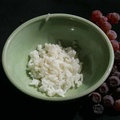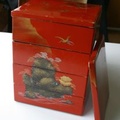Part 3 >>
Before the war we had celebrated Christmas even though we were Buddhists. We exchanged simple gifts and shopped for a tree. One of my mother’s dressmaking clients gave us a special Santa Claus ornament. “Be careful with that,” she cautioned. “It’s hand blown in Germany. It’s valuable.” Why would she entrust us with this, an item of such value? My brother and I added paper ornaments we made at school. I loved the gold and silver Japanese lanterns we fashioned by folding and slitting a paper cylinder. My brother straightened the previous year’s tin foil icicles and hung them one by one on the branches. If I impatiently flung a handful, he took them off and rehung them. “That’s wrong. They look messy.” I quit and let him finish.
One year Uncle Tamaki, my father’s friend, visited. He produced a shiny nickel and a dirty dime on his palm and asked us to pick one.
I pointed at the bigger nickel.
My brother took the dime. “Ha,” he said, “a dime is worth two of your nickels.”
I vowed that next year I wouldn’t be fooled again. I hated Tamaki san for tricking me. It made me feel so stupid.
“Oh, yes,” he said. “Here are special big socks you can hang up for Santa. Merry Christmas,” Mr. Tamaki beamed. He was a Buster Brown socks salesman.
“We don’t have a fireplace,” I reminded him. Besides, Santa Claus didn’t visit us. There was no reason to hang the socks. We saved them to “grow into.”
But we remembered our manners. “Thank you very much, Uncle Tamaki,” we said.
Another special holiday treat was a trip to the May Company window displays. Plaster carolers, mouths gaping, sang to music crackling from loudspeakers. Mary cradled Jesus like a jewel. Turbaned wise men bore gifts. A cardboard village surrounded the trunk of a huge tree spangled with glass globes. Santa Claus and his elves moved stiffly side to side hammering on the same toy. Tiny ceramic children sledded on a cotton batting hill sprinkled with glitter. I begged to go inside. “Next year. We have to go now,” my mother tugged me away. In another window I glimpsed a princess doll, blond curls showering down her back, wrapped in a shimmering pink gown dotted with pearls and sequins. She took my breath away. “That’s what I want for Christmas,” I said as we hurried away.
* * *
When Pearl Harbor was bombed, rumors flew. All Japanese would be forced back to Japan. We were the enemy. Immobilized by fear we stopped attending church and prayed at home in front of a benign painted Buddha on a scroll. “I want to stay in America. I don’t even speak Japanese—well, not much. We celebrate Christmas every year so that makes us Americans. Oh, please. Namuamidabutsu.”
We skipped presents and a tree that year. I didn’t get the princess doll.
Christmas the following year in 1942 at Amache unfolded in tantalizing bits. Our priest tacked celluloid holly above the windows. Some barrack windows framed a candle. A few people found stunted skeletal trees or bushes and decorated them. An artist offered a silk screening class for printing Christmas cards. Mrs. Bender introduced carols in class. When we had memorized a half dozen we joined the other fifth grade class and wandered neighboring barracks.
“Smile, children. Smile,” Mrs. Bender advised. “Sing with gladness.”
I had never gone “a-caroling”—it was not a California tradition. I was freezing. My toes and fingers felt like icicles. My lips wouldn’t open. “Gladness” was definitely not what I felt. A few people peered curiously from their windows; no one braved the cold to come outside.
“Smile. Open your mouths wide,” Mrs. Bender encouraged. “There’s hot cocoa waiting back at the school.”
Hot cocoa! That woke me from my reluctance. I sang with vigor, and what a delicious treat that was—real cocoa with a cookie.
At the final service of the year the reverend reminded us that Christ, Buddha, and Muhammad were all great saviors. “They envisioned a world of love and compassion. Buddha taught that salvation was achieved through a pure heart and rightful intentions. Christ sacrificed himself to save mankind. Buddha renounced a princely life and meditated for years to attain salvation. Muhammad taught from a holy book called the Koran. Whatever your beliefs, the key word is “love.” Namuamidabutsu.”
“Merry Christmas,” he announced, “ hope to see you after Oshougatsu.”
Holiday packages arrived. My parents received a card from Mr. and Mrs. Harrington. My mother pressed the envelope to her breast for a second…a fleeting prayer…before she slit the edge with her nail file. Only a signature, not a message, identified the card, but folded within was a check. A check for ten dollars, one week’s pay before the war.
She carefully tucked the check into her purse. No one had ever offered my parents “free” money. Money was to be earned. Perhaps Mrs. Harrington was keeping her promise of the ruby glasses. Perhaps one day that seed money would enable us to find a way to those gleaming goblets traced with gold.
On Christmas Eve we anticipated a special dinner. I hurried into the mess hall even before the cook rang the mess bell. I stopped short inside the door. A startling transformation had taken place. Floating through the hall was Bring Crosby’s creamy voice crooning “White Christmas.” Green and red crepe paper twisted across the ceiling. Candles flickered on some tables. A scrawny tree glistened with pine cones, yarn balls, funny-paper cranes, and newspaper chains, and most wondrous of all, an angel crowned the glittering tree—a quiet, serene one, eyes closed. Someone had tenderly pleated her cellophane wings which fluttered imperceptibly, catching slivers of light.
Suddenly Santa Claus burst in. What a strange sight!—a mask with upside down crescent moon eyes, a cotton batting beard, sagging red pajamas…It didn’t matter, though, as packages cascaded from two laundry bags. Although the packages read, “adult male or woman,” “child boy or girl,” he knew our names and dispersed the gifts with “Ho, ho, ho! Merry Christmas, Mrs. Sumida. Merry Christmas Tommy.”
When a mother restrained a toddler from wading into the pile with “No, no, we must wait,” the baby burst into tears and inciting a chorus of more wails. “Here, here.” Santa grabbed some random packages and tossed them to the children. In his haste he handed me one labeled “child boy.” I unwrapped a wooden yo-yo.
“You got a yo-yo, what a yo-yo,” a kid teased. “Santa thinks you’re a boy. You’re a boy.”
“Girls can play with yo-yos, too. See, I can make it spin,” I bragged, I flipped the toy down but it didn’t return. I tried again.
“Boys are better at that,” the boy boasted.
I flung the yo-yo toward him. “Here, you can have it then.” I tried to sound flippant. I wanted desperately to master this simple toy, but I hated being butter-fingered in front of all the other kids.
My mother rescued me. “Let’s have dinner together tonight,” she said, and led the way into the mess line. I filled my tray with ham and cranberry sauce and sat next to her at the long table.
My mother touched my arm. “Look,” she said. She placed a yo-yo between us.
“I know I can learn to do tricks with this,” I said.
“Yes, I know,” my mother answered.
That night the barbed wire and the guard towers with the pacing soldiers were like remote dreams. The soldiers maybe even envied us, inside by the warmth of a coal stove and wishing each other a better New Year.
I was happy.
(END)
* * *
Author’s note: This story is another chapter from “18286.” Over the years, especially during Christmas season, I’ve wondered whose hands wrapped those gifts distributed by our Oriental santa. They probably never knew how much it meant to me/us. The story is my “thank you.”
© 2010 Lily Yuriko Nakai Havey





